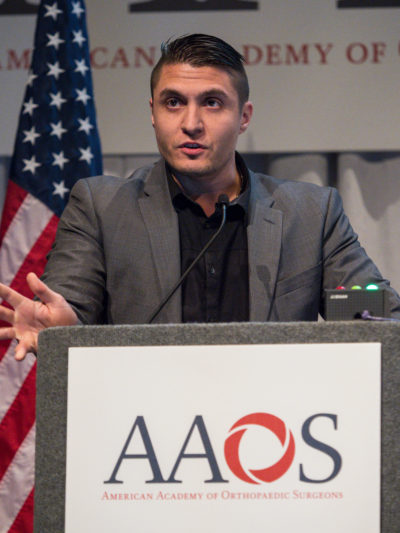Whether you matched your top choice or your #10 choice for residency, you will learn to appreciate several critical points that are vital to your evolution as a surgeon/physician of the future. Dr. Matthew Varacallo, Chief Orthopedic Resident at Drexel University College of Medicine/Hahnemann University Hospital in Philadelphia, Pennsylvania, outlines four critical points he learned to appreciate throughout his residency training process:
Point #1: The Program that Matched You is All That Matters
Outside of extreme circumstances and certain unfortunate situations in which a program truly breeds a malignant training environment (I’ll save this topic for a future discussion for sake of simplicity), the program that you matched into is all that matters. Trust me, I am sure that everyone reading this can recall or know of a friend of a friend who carries a grudge that they did not match his or her #1 choice (even after they told you that you were ranked to match). Once you match, stick to forward-thinking only and planning your career development as a physician/surgeon of tomorrow. Your energy and time should be devoted to how you can best train, adapt, and learn in that institution’s environment.
No residency program is without its own pitfalls and shortcomings. The key is to focus on how you can learn something new every single day you go to work.
Point #2: Whether You’re an Intern or a PGY-35 Attending Physician, Each Day Presents an Opportunity to Master and Perfect Your Skillset
Medicine is a complex dynamic field with ever-evolving treatment paradigms and clinical care guidelines that require us to appreciate the dynamic nature of our field.
One of my colleagues said it best during the middle of my PGY-2 year when I realized for the first of many times that I did not already know everything – he sat me down and told me, “This field has an uncanny knack of making you feel on top of the world one day only to turn around the next day and make you feel like you know nothing at all!”
Not to barrage you with quotes – but I want to reinforce and further highlight that there is essentially no end to learning and growing as a physician. One of my main mentors, after 30 years of specializing in complex orthopedic trauma and training at the top orthopedic trauma fellowship in the country once told me after a 10-hour case had finally finished, “I have been doing this for almost 30 years and I can honestly say that I still to this day pick up subtle nuances from each and every case.”
Point #3: Appreciate the Major Pitfalls of the Residency Training Process
We all discuss overhauls of the residency training process – from ending the financial insanity, changing the number of years required for graduation, and improving the core educational curriculum and training milestone checkboxes – we are all focusing on the same goal(s): to help better improve the quality of physicians/surgeons produced from these academic institutions in order to provide the best care for our future patients.
I learned early on that the major downside to the residency training process is the inherent lack of continuity of care we are able to provide. As soon as we get a concept down, we are often sent off to the next rotation where we start the learning process all over again. Personally, I found it pretty frustrating that I was not able to follow my own patients beyond a month or two at most.
There are some ways to mitigate this “black box” follow-up scenario – I recommend the following 3 suggestions:
- Always try to ask your attendings how the particularly memorable cases/patients are doing in follow-up visits
- Ask your colleagues that are rotating on the specific service in the ensuing months to keep an eye out for a particular group of patients – from my experience people will not willingly go out of their way to give you information so it is your responsibility to remain proactive in this regard
- Keep a list of the memorable patients, whether in a separate log book or in your hospital’s EMR (most systems allow you to do this in some fashion); this will allow you to keep tabs on the periphery if you see a patient gets readmitted or returns to the emergency department; this is somewhat of a makeshift setup, but it certainly is better than simply assuming the patient “did great!”
For example, this year I was feeling pretty good about my shoulder scoping skills after I “cured” a problem patient by performing what I thought was a bulletproof capsular plication procedure. The patient had a similar clinical course involving the other shoulder and she eventually bought herself a shoulder arthrodesis on the other side. I was certain that she would do well – wrong – three months later at an orthopedic conference in my city, I realized she not only did not follow up at our institution but was given a matching shoulder fusion on my side by a surgeon at another hospital. Damn, I thought, ‘I should have just fused her.’
Point #4: All Cheesiness Aside – Focus on Patient Care and You Will Not Go Wrong
There is endless variability on how a patient will fare after your treatment intervention. No matter how good you are or how great your postop X-ray may look – trust me there is a way that it can become a “bad outcome”. Surgeons tend to be control freaks by nature, and many of these qualities are beneficial to the surgical field and the Type A personality you have can serve you well when attention to detail is critical. One way or another all of us will be faced with a time when we realize that bad outcomes will happen and many times it will be out of our control.
Reps will bombard you with new products, you WILL be tempted to fall victim of financial kickbacks many times, and competing obligations with your family and/or friends will constantly compete with your ability to perform the ideal standard of patient care. Remain cognizant to keep the patient in the center of your focus; as long as you have his or her best interest at heart you will not fall victim to violating the Hippocratic oath.
These are my high yield points. Own the residency training process.
Best of luck in your careers,
Matt Varacallo, MD








